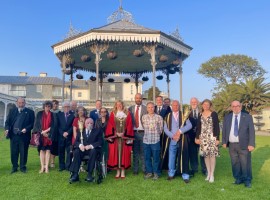The Local Government Transparency Code 2015 (the Code) came into effect on 1 April 2015. The code is issued by the Secretary of State for Communities and Local Government in exercise of powers under section 2 of the Local Government, Planning and Land Act 1980. The Code replaces any previous codes issued in relation to authorities in England under those powers.
The Code does not replace or supersede the existing framework for access to and re-use of public sector information provided by the:
- Freedom of Information Act 2000 (as amended by the Protection of Freedoms Act 2012)
- Environmental Information Regulations 2004
- Re-use of Public Sector Information Regulations 2005
- Infrastructure for Spatial Information in the European Community Regulations 2009
- Sections 25 and 26 of the Local Audit and Accountability Act 2014 which provides rights for persons to inspect a local authority’s accounting records and supporting documentation, and to make copies of them.
Falmouth Town Council meets the definition of a local authority covered by the requirements of the Code, as it is defined as ‘a parish council which has gross annual income or expenditure (whichever is higher) exceeding £200,000’.
The Code requires local authorities in England to publish the following information quarterly:
-
Expenditure exceeding £500 & Procurement Information
Expenditure April 2017.pdf
Expenditure May 2017.pdf
Expenditure June 2017.pdf
Expenditure July 2017.pdf
Expenditure August 2017.pdf
Expenditure September 2017.pdf
Expenditure October 2017.pdf
Expenditure November 2017.pdf
Expenditure December 2017.pdf
Expenditure January 2018.pdf
Expenditure February 2018
Expenditure March 2018
Expenditure April 2018
Expenditure May 2018
Expenditure June 2018
Expenditure July 2018
Expenditure August 2018
Expenditure September 2018
Expenditure October 2018
Expenditure November 2018
Expenditure December 2018
Expenditure January - March 2019
Expenditure April - June 2019
Expenditure July - September 2019
Additionally, local authorities are required to publish the following information annually:
-
Procurement Information (Quarterly)
The Council must publish details of every invitation to tender for contracts to provide goods and/or services with a value that exceeds £5,000. Contracts expected to be in excess of £25,000 are published via contracts finder here (link is external).
-
Local Authority Land (Annually)
Details all land and building assets held by Falmouth Town Council.
-
Fraud
The code requires that local authorities to publish the following information about their counter fraud work:
- Number of occasions they use powers under the Prevention of Social Housing Fraud (Power to Require Information) (England) Regulations 2014, or similar powers
- Total number (absolute and full time equivalent) of employees undertaking investigations and prosecutions of fraud
- Total number (absolute and full time equivalent) of professionally accredited counter fraud specialists
- Total amount spent by the authority on the investigation and prosecution of fraud
- Total number of fraud cases investigated
Falmouth Town Council has no staff members undertaking fraud investigation work and therefore has no information to publish.
-
Grants to voluntary, community and social enterprise organisations (Annually)
On transactions over £500.
-
Organisational Chart (Annually)
-
Parking Account
Falmouth Town Council does not operate car parks nor manage parking spaces and therefore has nothing to publish.
-
Parking Spaces (Annually)
Falmouth Town Council does not operate car parks nor manage parking spaces and therefore has nothing to publish.
-
Consitution
Local authorities are already required to make their constitution documents available for inspection at their offices under section 9P of the Local Government Act 2000. Local authorities must also, under the Code, publish their constitution on their website.
Falmouth Town Council’s constitution is made up of the Standing Orders, Financial Regulations and Internal Financial Controls, and Code of Conduct, which can be found by clicking on the links below.
Standing Orders and Financial Regulations
Members Code of Conduct
-
Senior Salaries (Annually)
Local authorities are required to publish, under the Accounts and Audit Regulations 2015, the following information with regard to senior salaries:
- The number of employees whose remuneration in that year was at least £50,000 in brackets of £5,000
- Details of remuneration and job title of certain senior employees whose salary is at least £50,000
- Employees whose salaries are £150,000 or more must also be identified by name.
In addition to this requirement, local authorities must place a link on their website to these published data or place the data itself on their website, together with a list of responsibilities (for example, the services and functions they are responsible for, budget held and number of staff) and details of bonuses and ‘benefits-in-kind’, for all employees whose salary exceeds £50,000.
Currently, Falmouth Town Council has one post where remuneration is £50,000 or greater and that is the post of the Town Clerk and Responsible Financial Officer which sits within the bracket of £60,000 to £65,000; this has been independently determined by the South West Councils organisation as on the LC4 benchmarking range and between Spinal Column Points 61-64.The Council has no employees whose salaries are over £150,000 per annum.
The Town Clerk and Responsible Financial Officer’s principal areas of responsibility are:
• Strategic leadership of the Town Council, working with Members, staff, partners and other tiers of local government to develop a clear vision and long term aims for the city and the city council
• Management of service performance, ensuring targets are achieved and contributing to delivery of corporate priorities within the statutory framework (c 42 members of staff and 16 elected Councillors)
• Lead work with key partners ensuring delivery of agreed objectives and targets
• Monitoring of all revenue and capital budgets for the Council, working with the Finance Officer, to achieve the financial objectives set by the Council (c £2.1million budget)
• Management of contract letting for all capital and revenue contracts and tenders, achieving best value
• Work with the senior management team to identify and develop business opportunities.
• Provide advice to the Mayor and Town Councillors on matters of civic protocol, statutory powers and public affairs generally
• Oversee the arrangements of town events and festivals, including civic ceremonial events
Falmouth Town Council does not pay bonuses or benefits in kind to employees.
Falmouth Town Council complies with the requirements of the Code by publishing this information on its website. Full details of the Code can be found here Local Government Transparency Code 2015.


























